2003年日语能力考试四级真题及答案
2014年日语四级2007-2003
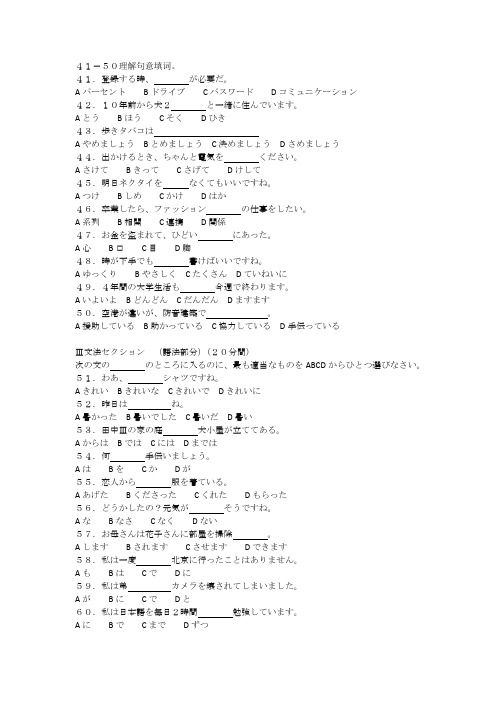
41-50理解句意填词。
41.登録する時、が必要だ。
AパーセントBドライブCパスワードDコミュニケーション42.10年前から犬2と一緒に住んでいます。
AとうBほうCそくDひき43.歩きタバコはAやめましょうBとめましょうC決めましょうDさめましょう44.出かけるとき、ちゃんと電気をください。
AさけてBきってCさげてDけして45.明日ネクタイをなくてもいいですね。
AつけBしめCかけDはか46.卒業したら、ファッションの仕事をしたい。
A系列B相関C連携D関係47.お金を盗まれて、ひどいにあった。
A心B口C目D胸48.時が下手でも書けばいいですね。
AゆっくりBやさしくCたくさんDていねいに49.4年間の大学生活も今週で終わります。
AいよいよBどんどんCだんだんDますます50.空港が違いが、防音建築で。
A援助しているB助かっているC協力しているD手伝っているⅢ文法セクション(語法部分)(20分間)次の文ののところに入るのに、最も適当なものをABCDからひとつ選びなさい。
51.わあ、シャツですね。
AきれいBきれいなCきれいでDきれいに52.昨日はね。
A暑かったB暑いでしたC暑いだD暑い53.田中Ⅲの家の庭犬小屋が立ててある。
AからはBではCにはDまでは54.何手伝いましょう。
AはBをCかDが55.恋人から服を着ている。
AあげたBくださったCくれたDもらった56.どうかしたの?元気がそうですね。
AなBなさCなくDない57.お母さんは花子さんに部屋を掃除。
AしますBされますCさせますDできます58.私は一度北京に行ったことはありません。
AもBはCでDに59.私は弟カメラを壊されてしまいました。
AがBにCでDと60.私は日本語を毎日2時間勉強しています。
AにBでCまでDずつ61.私が帰る家にいてください。
AまでにBうちにCあいだにDときに62.パソコンが初めての物にもわかる説明してください。
AのにBためにCようにDそうに63.鈴木さん、その記事を読み、私にも見せてください。
200301cet4真题答案与详解

2002年1月CET-4真题Part I Listening Comprehension (20 minutes)Section ADirections: In this section, you will hear 10 short conversations. At the end of each conversation, a question will be asked about what was said. Both theconversation and the question will be spoken only once. After eachquestion there will be a pause. During the pause, you must read the fourchoices marked A), B), C) and D), and decide which is the best answer.Then mark the corresponding letter on the Answer Sheet with a single linethrough the center.Example:You will hear:You will read:A) At the office.B) In the waiting room.C) At the airport.D) In a restaurant.From the conversation we know that the two were talking about some work they will start at 9 o’clock in the morning and have to finish at 2 in the afternoon. Therefore, D) “5 hours” is the correct answer. You should choose [D] on the Answer Sheet and mark it with a single line through the center.1. A) She has to post a letter instead.B) She has to turn down the man‟s request.C) She‟s not sure if the computer is fixed.D) She can‟t send the message right now.2. A) He didn‟t get the book he needed.B) He had no idea where the book was.C) The library is closed on weekends.D) He was not allowed to check out the book.3. A) Play a tape recorder.B) Take a picture.C) Repair a typewriter.D) Start a car.4. A) The woman rejected the man‟s apology.B) The woman appreciated the man‟s offer.C) The man had forgotten the whole thing.D) The man had hurt the woman‟s feelings.5. A) The woman is meeting the man at the airport.B) They are complaining about the poor airport service.C) They are discussing their plan for Christmas.D) The man is seeing the woman off.6. A) She plans to go to graduate school.B) She will drop out of school.C) She will stop working and concentrate on her studies.D) She will take a part-time job.7. A) He needs another job as research assistant.B) He asked Professor Williams for assistance.C) He assists Professor Williams with his teaching.D) He is doing research with Professor Williams.8. A) She thought there were no tickets left for the show.B) She thought the seats on the left side were fully occupied.C) The show was planned a long time ago.D) The audience were deeply impressed by the show.9. A) Mr. Long‟s briefing was unnecessarily long.B) The woman should have been more attentive.C) Mr. Long‟s briefing was not relevant to the mission.D) The woman needn‟t have attended the briefing.10. A) In a bank.B) In a school.C) In a clothing store.D) In a barbershop.Section BDirections:In this section, you will hear 3 short passages. At the end of each passage, you will hear some questions. Both the passage and the questions will bespoken only once. After you hear a question, you must choose the bestanswer from the four choices marked A), B), C) and D). Then mark thecorresponding letter on the Answer Sheet with a single line through thecenter.Passage oneQuestion 11 to 13 are based on the passage you have just heard.11. A) Because the bird couldn‟t repeat his master‟s name.B) Because the bird screamed all day long.C) Because the bird uttered the wrong word.D) Because the bird failed to say the name of the town.12. A) The cruel master.B) The man in the kitchen.C) The pet bird.D) The fourth chicken.13. A) The bird bad finally understood his threat.B) The bird managed to escape from the chicken house.C) The bird had learned to scream back at him.D) The bird was living peacefully with the chickens.Passage TwoQuestions 14 to 16 are based on the passage you have just heard.14. A) They are kept in open prisons.B) They are allowed out of the prison grounds.C) They are ordered to do cooking and cleaning.D) They are a small portion of the prison population.15. A) Some of their prisoners are allowed to study or work outside prisons.B) Most of their prisoners are expected to work.C) Their prisoners are often sent to special centers for skill training.D) Their prisoners are allowed freedom to visit their families.16. A) They are encouraged to do maintenance for the training centre.B) Most of them get paid for their work.C) They have to cook their own meals.D) They can choose to do community work.Passage ThreeQuestions 17 to 20 are based on the passage you have just heard.17. A) Because they have a driving license.B) Because they have received special training.C) Because the traffic conditions in London are good.D) Because the traffic system of the city is not very complex.18. A) Two to four months.B) About three weeks.C) At least half a year.D) Two years or more.19. A) Government officers are hard to please.B) The learner has to go through several tough tests.C) The learner usually fails several times before he passes it.D) The driving test usually last tow months.20. A) They don‟t want their present bosses to know what they‟re doing.B) They want to earn money from both jobs.C) They cannot earn money as taxi drivers yet.D) They look forward to further promotion.Part II Reading Comprehension (35 minutes)Directions:There are 4 passages in this part. Each passage is followed by some questions or unfinished statements. For each of them there are four choicesmarked A), B), C) and D). You should decide on the best choice and markthe corresponding letter on the Answer Sheet with a single line through thecentre.Passage oneQuestions 21 to 25 are based on the following passage.Some pessimistic experts feel that the automobile is bound to fall into disuse. They see a day in the not-too-distant future when all autos will be abandoned and allowed to rust. Other authorities, however, think the auto is here to stay. They hold that the car will remain a leading means of urban travel in the foreseeable future.The motorcar will undoubtedly change significantly over the next 30 years. It should become smaller, safer, and more economical, and should not be powered by the gasoline engine. The car of the future should be far more pollution-free than present types.Regardless of its power source, the auto in the future will still be the main problem in urban traffic congestion (拥挤). One proposed solution to this problem is the automated highway system.When the auto enters the highway system, a retractable (可伸缩的) arm will drop from the auto and make contact with a rail, which is similar to those powering subway trains electrically. Once attached to the rail, the car will become electrically powered from the system, and control of the vehicle will pass to a central computer. The computer will then monitor all of the car‟s movements.The driver will use a telephone to dial instructions about his destination into the system. The computer will calculate the best route, and reserve space for the car all the way to the correct exit from the highway. The driver will then be free to relax and wait for the buzzer (蜂鸣器) that will warn him of his coming exit. It is estimated that an automated highway will be able to handle 10,000 vehicles per hour, compared with the 1,500 to 2,000 vehicles that can be carried by a present-day highway.21. One significant improvement in the future car will probably be _____________.A) its power source C) its monitoring systemB) its driving system D) its seating capacity22. What is the author‟s main concern?A) How to render automobiles pollution-free.B) How to make smaller and safer automobiles.C) How to solve the problem of traffic jams.D) How to develop an automated subway system.23. What provides autos with electric power in an automated highway system?A) A rail. C) A retractable arm.B) An engine. D) A computer controller.24. In an automated highway system, all the driver needs to do is _____________.A) keep in the right laneB) wait to arrive at his destinationC) keep in constant touch with the computer centerD) inform the system of his destination by phone25. What is the author‟s attitude toward the future of autos?A) Enthusiastic. C) Optimistic.B) Pessimistic. D) Cautious.Passage TwoQuestions 26 to 30 are based on the following passage.Foxes and farmers have never got on well. These small dog-like animals have long been accused of killing farm animals. They are officially classified as harmful and farmers try to keep their numbers down by shooting or poisoning them.Farmers can also call on the services of their local hunt to control the fox population. Hunting consists of pursuing a fox across the countryside, with a group of specially trained dogs, followed by men and women riding horses. When the dogs eventually catch the fox they kill it or a hunter shoots it.People who take part in hunting think of as a sport; they wear a special uniform of red coats and white trousers, and follow strict codes of behavior. But owning a horse and hunting regularly is expensive, so most hunters are wealthy.It is estimated that up to 100,000 people watch or take part in fox hunting. But over the last couple of decades the number of people opposed to fox hunting, because they think it is brutal (残酷的), has risen sharply. Nowadays it is rare for a hunt to pass off without some kind of confrontation (冲突) between hunters and hunt saboteurs (阻拦者). Sometimes these incidents lead to violence, but mostly saboteurs interfere with the hunt by misleading riders and disturbing the trail of the fox‟s smell, which the dogs follow.Noisy confrontations between hunters and saboteurs have become so common that they are almost as much a part of hunting as the pursuit of foxes itself. But this year supporters of fox hunting face a much bigger threat to their sport. A Labour Party Memberof the Parliament, Mike Foster, is trying to get Parliament to approve a new law which will make the hunting of wild animals with dogs illegal. If the law is passed, wild animals like foxes will be protected under the ban in Britain.26. Rich people in Britain have been hunting foxes ___________.A) for recreation C) to limit the fox populationB) in the interests of the farmers D) to show off their wealth27. What is special about fox hunting in Britain?A) It involves the use of a deadly poison.B) It is a costly event which rarely occurs.C) The hunters have set rules to follow.D) The hunters have to go through strict training.28. Fox hunting opponents often interfere in the game _____________.A) by resorting to violence C) by taking legal actionB) by confusing the fox hunters D) by demonstrating on the scene29. A new law may be passed by the British Parliament to ______________.A) prohibit farmers from hunting foxesB) forbid hunting foxes with dogsC) stop hunting wild animals in the countrysideD) prevent large-scale fox hunting30. It can be inferred from the passage that ___________.A) killing foxes with poison is illegalB) limiting the fox population is unnecessaryC) hunting foxes with dogs is considered cruel and violentD) fox-hunting often leads to confrontation between the poor and the richPassage ThreeQuestions 31 to 35 are based on the following passage.For an increasing number of students at American universities, Old is suddenly in. The reason is obvious: the graying of America means jobs. coupled with the aging of the baby-boom (生育高峰) generation, a longer life span means that the nation‟s elderly population is bound to expand significantly over the next 50 years. By 2050, 25 percent of all Americans will be older than 65, up from 14 percent in 1995. The change poses profound questions for government and society, of course. But it also creates career opportunities in medicine and health professions, and in law and business as well. “In addition to the doctors, we‟re going to need more sociologists, biologists, urban planners and specialized lawyers,” says Professor Edward Schneider of the University of Southern California‟s (USC) School of Gerontology (老年学).Lawyers can specialize in “elder law,”which covers everything from trusts and estates to nursing-home abuse and age discrimination (歧视). Businessmen see hugeopportunities in the elder market because the baby boomers, 74 million strong, are likely to be the wealthiest group of retirees in human history. “Any student who combines an expert knowledge in gerontology with, say, an MBA or law degree will have a license to print money,” one professor says.Margarite Santos is a 21-year-old senior at USC. She began college as a biology major but found she was “really bored with bacteria.” So she took a class in gerontology and discovered that she lied it. She says, “I did volunteer work in retirement homes and it was very satisfying.”31. “…Old is suddenly in” (Line 1, Para. 1) most probably means “______________”.A) America has suddenly become a nation of old peopleB) gerontology has suddenly become popularC) more elderly professors are found on American campusesD) American colleges have realized the need of enrolling older students32. With the aging of America, lawyers can benefit _________________.A) from the adoption of the “elder law”B) from rendering special services to the elderlyC) by enriching their professional knowledgeD) by winning the trust of the elderly to promote their own interests33. Why can businessmen make money in the emerging elder market?A) Retirees are more generous in spending money.B) They can employ more gerontologists.C) The elderly possess an enormous purchasing power.D) There are more elderly people working than before.34. Who can make big money in the new century according to the passage?A) Retirees who are business-minded.B) The volunteer workers in retirement homes.C) College graduates with an MBA or law degree.D) Professionals with a good knowledge of gerontology.35. It can be seen from the passage that the expansion of America‟s elderly population________.A) will provide good job opportunities in many areasB) will impose an unbearable burden on societyC) may lead to nursing home abuse and age discriminationD) will create new fields of study in universitiesPassage FourQuestions 36 to 40 are based on the following passage.The decline in moral standards — which has long concerned social analysts — has at last captured the attention of average Americans. And Jean Bethke Elshtain, for one, is glad.The fact the ordinary citizens are now starting to think seriously about the nation‟s moral climate, says this ethics (伦理学) professor at the University of Chicago, is reason to hope that new ideas will come forward to improve it.But the challenge is not to be underestimated. Materialism and individualism in American society are the biggest obstacles. “The thought that …I‟m in it for me‟has become deeply rooted in the national consciousness,” Ms. Elshtain says.Some of this can be attributed to the disintegration of traditional communities, in which neighbors looked out for one another, she says. With today‟s greater mobility and with so many couples working, those bonds have been weakened, replaced by a greater emphasis on self.In a 1996 poll of Americans, loss of morality topped the list of the biggest problems facing the U.S. And Elshtain says the public is correct to sense that: Data show that Americans are struggling with problems unheard of in the 1950s, such as classroom violence and a high rate of births to unmarried mothers.The desire for a higher moral standard is not a lament (挽歌) for some nonexistent “golden age,”Elshtain says, nor is it a wishful (一厢情愿的) longing for a time that denied opportunities to women and minorities. Most people, in fact, favor the lessening of prejudice.Moral decline will not be reversed until people find ways to counter the materialism in society, she says. “Slowly, you recognize that the things that matter are those that cant‟be bought.”36. Professor Elshtain is pleased to see that Americans _____________.A) have adapted to a new set of moral standardsB) are longing for the return of the good old daysC) have realized the importance of material thingsD) are awakening to the lowering of their moral standards37. The moral decline of American society is caused manly by ________________.A) its growing wealthB) the self-centeredness of individualsC) underestimating the impact of social changesD) the prejudice against women and minorities38. Which of the following characterizes the traditional communities?A) Great mobility. C) Emphasis on individual effort.B) Concern for one‟s neighbors. D) Ever-weakening social bonds.39. In the 1950s, classroom violence _______________.A) was something unheard of C) attracted a lot of pubic attentionB) was by no means a rare occurrence D) began to appear in alalysts‟ data40. According to Elshtain, the current moral decline may be reversed _________________.A) if people can return to the “golden age”B) when women and mean enjoy equal rightsC) when people rid themselves of prejudiceD) if less emphasis is laid on material thingsPart III Vocabulary and Structure (20 minutes)Directions:There are 30 incomplete sentences in this part. For each sentence there are four choices marked A), B), C) and D). Choose the ONE that best completesthe sentence. Then mark the corresponding letter on the Answer Sheet with asingle line through the center.41 By the time you get to New York, I ________ for London.A) would be leaving B) am leavingC) have already left D) shall have left42 The article suggests that when a person ________ under unusual stress he should beespecially careful to have a well-balanced diet.A) is B) wereC) be D) was43 The lawyer advised him to drop the ________, since he stands little chance to win.A) event B) incidentC) case D) affair44 Sometimes children have trouble ________ fact from fiction and may believe thatsuch things actually exist.A) to separate B) separatingC) for separating D) of separating45 He is quite sure that it‟s ________ impossible for him to fulfill the task within two days.A) absolutely B) exclusivelyC) fully D) roughly46 There was a big hole in the road which ________ the traffic.A) set back B) stood backC) held up D) kept down47 Many a delegate was in favor of his proposal that a special committee ________ toinvestigate the incident.A) were set up B) was set upC) be set up D) set up48 In the Chinese household, grandparents and other relatives play ________ roles inraising children.A) incapable B) indispensableC) insensible D) infinite49 Eye contact is important because wrong contact may create a communication ________.A) tragedy B) vacuumC) question D) barrier50 There was such a long line at the exhibition _____ we had to wait for about half an hour.A) as B) thatC) so D) hence51 There is no ________ to there house from the main road.A) access B) avenueC) exposure D) edge52 ________ energy under the earth must be released in one form or another, forexample, an earthquake.A) Accumulated B) GatheredC) Assembled D) Collected53 He wasn‟t appointed chairman of the committee, ________ not very popular with allits members.A) to be considered B) consideringC) being considered D) having considered54 The twentieth century has witnessed an enormous worldwide political, economic andcultural ________.A) tradition B) transportationC) transmission D) transformation55 The ________ stuck on the envelope says “By Air”.A) diagram B) labelC) signal D) mark56 Mobile telecommunications ________ is expected to double in Shanghai this year asa result of a contract signed between the two companies.A) capacity B) potentialC) possession D) impact57 Reading ________ the lines, I would say that the Government are more worried thanthey will admit.A) behind B) betweenC) along D) among58 My brother‟s plans are very ________; he wants to master English, French andSpanish before he is sixteen.A) arbitrary B) aggressiveC) ambitious D) abundant59 Things might have been much worse if the mother ______ on her right to keep the baby.A) has been insisting B) had insistedC) would insist D) insisted60 The statistical figures in that report are not ________. You should not refer to them.A) accurate B) fixedC) delicate D) rigid61 Contrast may make something appear more beautiful than it is when ________ alone.A) seen B) is seenC) to be seen D) having been seen62 The football game comes to you ________ from New York.A) lively B) aliveC) live D) living63 None of us expected the chairman to ________ at the party. We thought he was stillin hospital.A) turn in B) turn overC) turn up D) turn down64 The mother didn‟t know who ________ for the broken glass.A) blamed B) be blamedC) to blame D) would blame65 He ________ to his customers and halved the price.A) leaked B) drewC) quoted D) yielded66 Tryon was extremely angry, but cool-headed enough to ________ storming into theboss‟s office.A) prevent B) prohibitC) turn D) avoid67 All flights ________ because of the terrible weather, they had to go there by train.A) having been canceled B) had been canceledC) having canceled D) were canceled68 The author of the report is well ________ with the problems in the hospital becausehe has been working there for many years.A) informed B) acquaintedC) enlightened D) acknowledged69 The boy spent as much time watching TV as he ________ studying.A) does B) hadC) was D) did70 The ships‟generator broke down, and the pumps had to be operated ________instead of mechanically.A) manually B) artificiallyC) automatically D) syntheticallyPart IV Cloze (15 minutes)Directions:There are 20 blanks in the following passage. For each blank there are four choices marked A), B), C) and D) on the right side of the paper. Youshould choose the ONE that best fits into the passage. Then mark thecorresponding letter on the Answer Sheet with a single line through thecentre.One summer night, on my way home from work I decided to see a movie. I knew the theatre would be air-conditioned and I couldn‟t face my __71__ apartment.Sitting in the theatre I had to look through the __72__ between the two tall heads in front of me. I had to keep changing the __73__ every time she leaned over to talk to him, __74__ he leaned over to kiss her. Why do Americans display such __75__ in a public place?I thought the movie would be good for my English, but __76__ it turned out, it was an Italian move. __77__ about an hour I decided to give up on the movie and __78__ on my popcorn (爆玉米花). I‟ve never understood why they give you so much popcorn! It tasted pretty good, __79__. After a while I heard __80__ more of the romantic-sounding Italians. I just heard the __81__ of the popcorn crunching (咀嚼) between my teeth. My thought stated to __82__. I remembered when I was is South Korea (韩国), I __83__ to watch Kojak on TV frequently. He spoke perfect Korean —I was really amazed. He seemed like a good friend to me, __84__ I saw him again in New York speaking __85__ English instead of perfect Korean. He didn‟t even have a Korean accent and I __86__ like I had been betrayed.When our family moved to the United States six years ago, none of us spoke any English. __87__ we had begun to learn a few words, my mother suggested that we all should speak English at home. Everyone agreed, but our house became very __88__ and we all seemed to avoid each other. We sat at the dinner table in silence, preferring that to __89__ in a difficult language. Mother tried to say something in English but it __90__ out all wrong and we all burst into laughter and decided to forget it! We‟ve been speaking Korean at home ever since.71. A) warm B) hot C) heated D) cool72. A) crack B) blank C) break D) opening73. A) aspect B) view C) space D) angle74. A) while B) whenever C) or D) and75. A) attraction B) attention C) affection D) motion76. A) since B) when C) what D) as77. A) Within B) After C) For D) Over78. A) concentrate B) chew C) fix D) taste79. A) too B) still C) though D) certainly80. A) much B) any C) no D) few81. A) voice B) sound C) rhythm D) tone82. A) wonder B) wander C) imagine D) depart83. A) enjoyed B) happened C) turned D) used84. A) until B) because C) then D) therefore85. A) artificial B) informal C) perfect D) practical86. A)felt B) looked C) seemed D) appeared87. A) While B) If C) Before D) Once88. A) empty B) quiet C) stiff D) calm89. A) telling B) uttering C) saying D) speaking90. A) worked B) got C) came D) madePart V Writing (30 minutes)Directions:For this part, you are allowed thirty minutes to write a composition on the topic: A Letter to the University President about the Canteen Service onCampus You should write at least 100 words, and base your compositionon the outline given in Chinese below:假设你是李明,请你就本校食堂的状况给校长写一封信,内容应涉及食堂的饭菜质量、价格、环境、服务等,可以是表扬,可以是批评建议,也可以兼有而有之。
2003年-2008

2003年問題Ⅰ例1:男の人と女の人が話しています。
教室はどうなりますか。
男:山田さん、授業でテープレコーダーを使いますから、教室にテープレコーダーを持っていってください。
女:はい。
男:あ、で、ドアは開けたままにしておいてください。
女:はい。
教室はどうなりますか。
正しい答えは、1です。
解答用紙の、問題1の、例1のところを見てください。
ただしい答えは、1ですから、答えはこのように書きます。
例2:夫と妻が友達に上げるものについて話しています。
二人は何を上げますか。
女:結婚祝い、何にしましょうか。
コーヒーカップのセットなんて平凡かなあ。
男:何がいいかなあ。
女:スプーンセットなんてどうかな。
男:うーん、ワインセットなんてどうだい?女:それは、あなたがほしいものでしょ。
男:いっそ、ベビー服っていうのは?女:気が早いわよ。
やっばり、コーヒーカップにしない?男:よし、分かった。
そうしよう。
二人は何を上げますか。
正しい答えは、1です。
解答用紙の、問題1の、例2のところを見てください。
ただしい答えは、1ですから、答えはこのように書きます。
1番女の人が事故の話をしています。
事故はどのようにおこりましたか。
女: 今朝六時ごろ、中央3丁目の交差点で、トラックが右に曲がろうとしたところにバスがぶつかり、6人が大けがをしました。
事故はどの様に起こりましたか。
答え:32番2人の男の子が話しています。
大黒山は、どの人ですか。
男1:あっ、お相撲さんだ……大黒山もいる男2:ほんどだ。
すごい筋肉だね。
男1:背はそんなに高い方じゃないのにね。
男2:うん。
大黒山は、どの人ですか。
答え:23番女の人が鬼について話しています。
鬼はどんな顔としていますか。
女:これはこの地方に伝わる鬼の顔です。
髪の毛は縮れ、頭に角があります。
目や鼻は大きく、耳は尖っています。
鬼はどんな顔をしていますか。
答え:44番男の人と女の人が電車の中で話しています。
吉田さんは、今、どんな様子ですか。
2002年日语专业四级真题
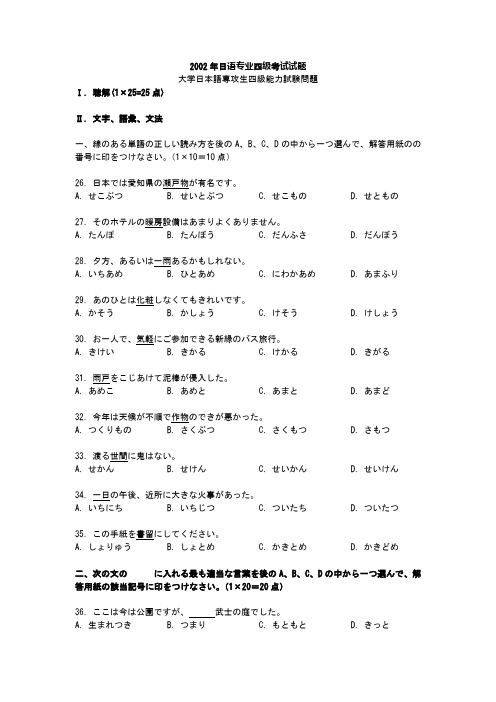
2002年日语专业四级考试试题大学日本語専攻生四級能力試験問題Ⅰ.聴解(1×25=25点)Ⅱ.文字、語彙、文法一、線のある単語の正しい読み方を後のA、B、C、Dの中から一つ選んで、解答用紙のの番号に印をつけなさい。
(1×10=10点)26.日本では愛知県の瀬戸物が有名です。
A.せこぶつB.せいとぶつC.せこものD.せともの27.そのホテルの暖房設備はあまりよくありません。
A.たんぽB.たんぼうC.だんふさD.だんぼう28.夕方、あるいは一雨あるかもしれない。
A.いちあめB.ひとあめC.にわかあめD.あまふり29.あのひとは化粧しなくてもきれいです。
A.かそうB.かしょうC.けそうD.けしょう30.お一人で、気軽にご参加できる新緑のバス旅行。
A.きけいB.きかるC.けかるD.きがる31.雨戸をこじあけて泥棒が侵入した。
A.あめこB.あめとC.あまとD.あまど32.今年は天候が不順で作物のできが悪かった。
A.つくりものB.さくぶつC.さくもつD.さもつ33.渡る世間に鬼はない。
A.せかんB.せけんC.せいかんD.せいけん34.一日の午後、近所に大きな火事があった。
A.いちにちB.いちじつC.ついたちD.ついたつ35.この手紙を書留にしてください。
A.しょりゅうB.しょとめC.かきとめD.かきどめ二、次の文のに入れる最も適当な言葉を後のA、B、C、Dの中から一つ選んで、解答用紙の該当記号に印をつけなさい。
(1×20=20点)36.ここは今は公園ですが、武士の庭でした。
A.生まれつきB.つまりC.もともとD.きっと37.両者の関係は冷えいた。
A.打ってB.立ってC.待ってD.切って38.よく来てくれました。
A.あれあれB.どれC.やっD.どれどれ39.各国の人と交流して、自分を。
A.捨てたいB.磨きたいC.流したいD.洗いたい40.今さら謝りに来てももう遅い。
A.のこのこB.よたよたC.とぼとぼD.しゃあしゃあ41.あの人は口が軽いから、秘密をもらし。
2003年日语专业四级考试试题_答案
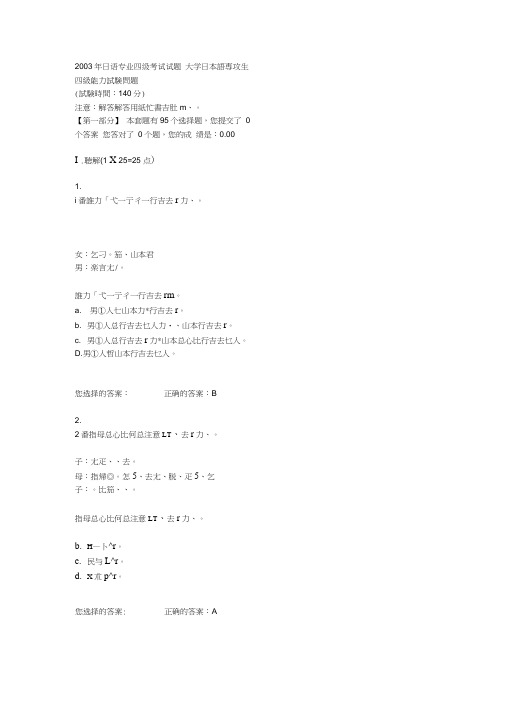
2003年日语专业四级考试试题大学日本語専攻生四級能力試験問題(試験時間:140分)注意:解答解答用紙忙書吉肚m、。
【第一部分】本套题有95个选择题,您提交了0个答案您答对了0个题,您的成绩是:0.00I .聴解(1 X 25=25 点)1.i番誰力「弋一亍彳一行吉去r力、。
女:乞刁。
笳、山本君男:楽言尢/。
誰力「弋一亍彳一行吉去rm。
a. 男①人七山本力*行吉去r。
b. 男①人总行吉去乜人力・、山本行吉去r。
c. 男①人总行吉去r力*山本总心比行吉去乜人。
D.男①人哲山本行吉去乜人。
您选择的答案:正确的答案:B2.2番指母总心比何总注意LT、去r力、。
子:尢疋、、去。
母:指帰◎。
怎5、去尢、脱、疋5、乞子:。
比笳、、。
指母总心比何总注意LT、去r力、。
b.H—卜^r。
c.民与L^r。
d.X朮p^r。
您选择的答案: 正确的答案:A3番図書館m—人何冊借女:乙n、全部田昔。
先週何冊力、借男:笳、先週三冊借尢人疋。
匕^、乙n七乙n①二冊、指願吉去r力、? 女:^、、二冊、大丈夫^To図書館m—人何冊借©^n^r^oA. 2冊^ToB. 3冊^ToC. 4冊^ToD. 5冊^To您选择的答案:正确的答案:D4.4番女①人总乙n力、5何总u去T力、。
女:一男:民手疋食女:笳肚l、。
乙①餃子哲食^TUo女①人处乙n力、5何总u去r力、。
A. v-yy^ 作©去ToB. v-yy^食卞去ToC. 餃子^o<©^ToD. 箸总出L^To您选择的答案:正确的答案:D5.5番二人总何总待oT^^T^o男:来肚、、肚笳。
道力•込召①力、肚。
女:乙n以上遅、木村失礼/男:駅前去疋行力、。
笳乞乙肚5、、1哲何台力、止去oTE力、5。
女:乞TU。
笳、来尢肚、、。
怎5。
男:疋的疋。
一人乗oT^^o二人总何总待oT、去T力、。
A. 夕八一C. 電車D. 木村您选择的答案: 正确的答案:A6.6番二人①学生力•学校疋話男①学生授業皿此何总歹料男:田中^人、笳L尢O授業、本总読九才、、人疋/相。
2003年日语专业四级考试试题
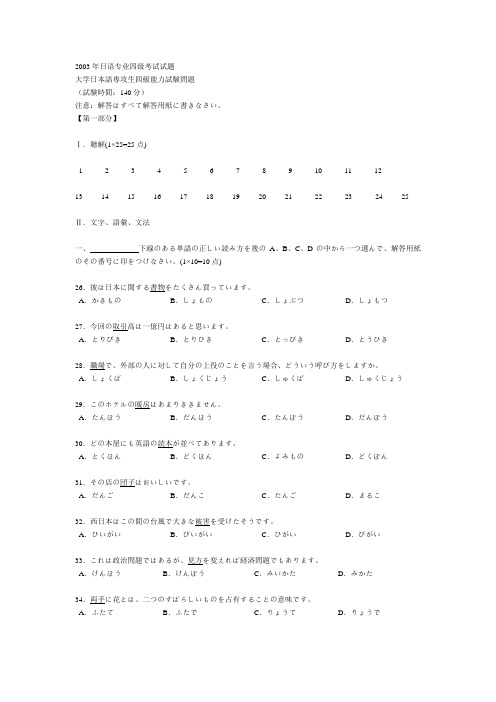
2003年日语专业四级考试试题大学日本語専攻生四級能力試験問題(試験時間:140分)注意:解答はすべて解答用紙に書きなさい。
【第一部分】Ⅰ.聴解(1×25=25点)1 2 3 4 5 6 7 8 9 10 11 1213 14 15 16 17 18 19 20 21 22 23 24 25Ⅱ.文字、語彙、文法一、下線のある単語の正しい読み方を後のA、B、C、Dの中から一つ選んで、解答用紙のその番号に印をつけなさい。
(1×10=10点)26.彼は日本に関する書物をたくさん買っています。
A.かきものB.しょものC.しょぶつD.しょもつ27.今回の取引高は一億円はあると思います。
A.とりびきB.とりひきC.とっぴきD.とうひき28.職場で、外部の人に対して自分の上役のことを言う場合、どういう呼び方をしますか。
A.しょくばB.しょくじょうC.しゅくばD.しゅくじょう29.このホテルの暖房はあまりききません。
A.たんほうB.だんほうC.たんぼうD.だんぼう30.どの本屋にも英語の読本が並べてあります。
A.とくほんB.どくほんC.よみものD.どくぼん31.その店の団子はおいしいです。
A.だんごB.だんこC.たんごD.まるこ32.西日本はこの間の台風で大きな被害を受けたそうです。
A.ひいがいB.びいがいC.ひがいD.びがい33.これは政治問題ではあるが、見方を変えれば経済問題でもあります。
A.けんほうB.けんぼうC.みいかたD.みかた34.両手に花とは、二つのすばらしいものを占有することの意味です。
A.ふたてB.ふたでC.りょうてD.りょうで35.理屈に合った話なら、反対する人はいないでしょう。
A.りきょくB.りくつC.りこつD.りっくつ二、次の文の_____に入れるのに最も適当な言葉を後のA、B、C、Dの中から一つ選んで、解答用紙のその番号に印をつけなさい。
(1×20=20点)36.今は下手だけど、一生懸命練習すれば__上手になるからね。
2003年大学日语专四日语专业四级真题 及答案

2003年大学日本語専攻生四級能力試験問題Ⅱ.文字、語彙、文法一、下線のある単語の正しい読み方を後のA、B、C、Dの中から一つ選んで、解答用紙のその番号に印をつけなさい。
26.彼は日本に関する書物をたくさん買っています。
A、かきものB、しょものC、しょぶつD、しょもつ27.今回の取引高は一億円はあると思います。
A、とりびきB、とりひきC、とっぴきD、とうひき28.職場で、外部の人に対して自分の上役のことを言う場合、どういう呼び方をしますか。
A、しょくばB、しょくじょうC、しゅくばD、しゅくじょう29.このホテルの暖房はあまりききません。
A、たんほうB、だんほうC、たんぼうD、だんぼう30.どの本屋にも英語の読本が並べてあります。
A、とくほんB、どくほんC、よみものD、どくぼん31.その店の団子はおいしいです。
A、だんごB、だんこC、たんごD、まるこ32.西日本はこの間の台風で大きな被害を受けたそうです。
A、ひいがいB、びいがいC、ひがいD、びがい33.これは政治問題ではあるが、見方を変えれば経済問題でもあります。
A、けんほんB、けんぼんC、みいかたD、みかた34.両手に花とは、二つのすばらしいものを占有することの意味です。
A、ふたてB、ふだでC、りょうてD、りょうで35.理屈に合った話なら、反対する人はいないでしょう。
A、りきょくB、りくつC、りこつD、りっくつ二、次の文の__に入れるのに最も適当な言葉を後のA、B、C、Dの中から一つ選んで、解答用紙のその番号に印をつけなさい。
36.いまは下手だけど、一生懸命練習すれば__上手になるからね。
A、当分B、しばらくC、そのうちにD、よく37.持っていたお金を__使ってしまって、おみやげが買えなくなった。
A、じゅうぶんB、たいていC、ずっとD、すっかり38.先生への年賀状は__出したよ。
A、とっくにB、いまだにC、すぐにD、じつに39.野球の高橋選手は力いっぱい飛んできたボールを__。
日语专四
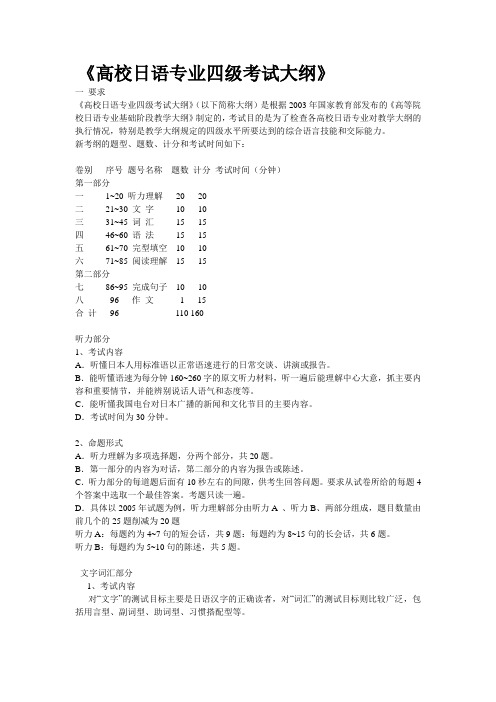
《高校日语专业四级考试大纲》一要求《高校日语专业四级考试大纲》(以下简称大纲)是根据2003年国家教育部发布的《高等院校日语专业基础阶段教学大纲》制定的,考试目的是为了检查各高校日语专业对教学大纲的执行情况,特别是教学大纲规定的四级水平所要达到的综合语言技能和交际能力。
新考纲的题型、题数、计分和考试时间如下:卷别序号题号名称题数计分考试时间(分钟)第一部分一1~20 听力理解20 20二21~30 文字10 10三31~45 词汇15 15四46~60 语法15 15五61~70 完型填空10 10六71~85 阅读理解15 15第二部分七86~95 完成句子10 10八96 作文 1 15合计 96 110 160听力部分1、考试内容A.听懂日本人用标准语以正常语速进行的日常交谈、讲演或报告。
B.能听懂语速为每分钟160~260字的原文听力材料,听一遍后能理解中心大意,抓主要内容和重要情节,并能辨别说话人语气和态度等。
C.能听懂我国电台对日本广播的新闻和文化节目的主要内容。
D.考试时间为30分钟。
2、命题形式A.听力理解为多项选择题,分两个部分,共20题。
B.第一部分的内容为对话,第二部分的内容为报告或陈述。
C.听力部分的每道题后面有10秒左右的间隙,供考生回答问题。
要求从试卷所给的每题4个答案中选取一个最佳答案。
考题只读一遍。
D.具体以2005年试题为例,听力理解部分由听力A 、听力B、两部分组成,题目数量由前几个的25题削减为20题听力A:每题约为4~7句的短会话,共9题:每题约为8~15句的长会话,共6题。
听力B:每题约为5~10句的陈述,共5题。
文字词汇部分1、考试内容对“文字”的测试目标主要是日语汉字的正确读者,对“词汇”的测试目标则比较广泛,包括用言型、副词型、助词型、习惯搭配型等。
2、命题形式本部分为多项选择题,由25道组成,每题有四个选项。
其中汉字的读法有10题,占10分(前5个根据汉字写出读者,后5个为根据读者写出汉字),词汇的用法有15题,占15分。
日语专四2004年真题

好的2004年大学日本語専攻生四級能力試験問題(試験時間:140分)注意:解答はすべて解答用紙に書きなさい。
【第一部分】Ⅰ.聴解(1×25=25点)Ⅱ.文字、語彙、文法一、次の文の下線をつけた漢字の正しい読み方を、後のA、B、C、Dの中から一つ選びなさい。
(1×10=10点)26.きめの細かい、なめらかなクリームの方が皮膚に良い。
A.ほそB.ほさC.こめD.こま27.僕はよく休日を利用して旅行にいく。
A.やすみひB.やすみびC.きゅうにちD.きゅうじつ28.彼はさすが有名な歌手だけあって、いい喉をしている。
A.のとB.のどC.のうとD.のうど29.それは客観的現実にあわない、無邪気な考え方にすぎない。
A.ぶじゃけB.ぶじゃきC.むじゃけD.ぶじゃき30.封建的人間関係は、社会の近代化を著しく妨げるものである。
A.はばみB.こばみC.さまたD.さまち31.このような珍しい本を入手することはなかなか容易なことではないんだよ。
A.よいB.よういC.よえきD.ようえき32.きみに恥をかかせるようなことは決してしない。
A.はじB.はずC.はちD.さらし33.頂上へ近づくにしたがってしだいに眺めがよくなる。
A.なぞB.のぞC.ながD.のが34.本屋の店内には天井まで本がぎっしり積み上げられている。
A.てんじょうB.てんせいC.てんいD.てんじん35.技術はね、そう簡単に習えるものではないんだよ。
A.まなB.しゅうC.ならD.しゅ二、次の文__に入れるのに最も適当な言葉を後のA、B、C、Dから一つ選びなさい。
(1×20=20点)36.人間は誰でも、見てはいけない言われると__見たくなるものだ。
A.あまりB.かなりC.なかなかD.よけい37.持っていたお金を__使ってしまって、おみやげも買えなくなった。
A.じゅうぶんB.すっかりC.ずっとD.ちょっと38.病気だと聞いてお見舞いに行ったが、__元気だった。
2003年日语专业四级考试试题_答案
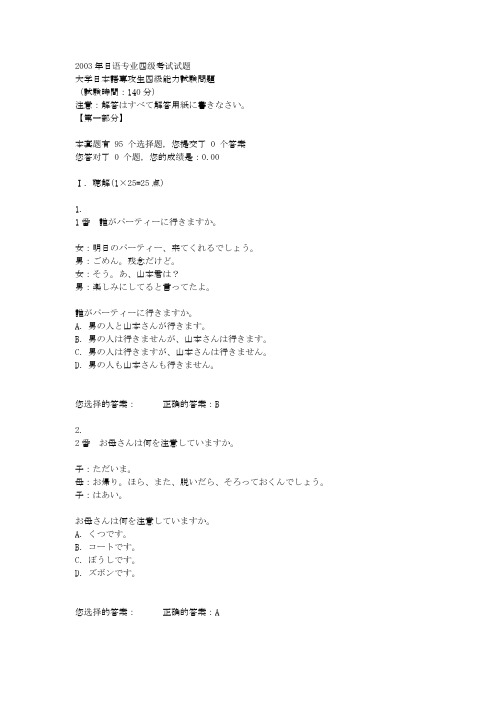
2003年日语专业四级考试试题大学日本語専攻生四級能力試験問題(試験時間:140分)注意:解答はすべて解答用紙に書きなさい。
【第一部分】本套题有 95 个选择题,您提交了 0 个答案您答对了 0 个题,您的成绩是:0.00Ⅰ.聴解(1×25=25点)1.1番誰がパーティーに行きますか。
女:明日のパーティー、来てくれるでしょう。
男:ごめん。
残念だけど。
女:そう。
あ、山本君は?男:楽しみにしてると言ってたよ。
誰がパーティーに行きますか。
A.男の人と山本さんが行きます。
B.男の人は行きませんが、山本さんは行きます。
C.男の人は行きますが、山本さんは行きません。
D.男の人も山本さんも行きません。
您选择的答案:正确的答案:B2.2番お母さんは何を注意していますか。
子:ただいま。
母:お帰り。
ほら、また、脱いだら、そろっておくんでしょう。
子:はあい。
お母さんは何を注意していますか。
A.くつです。
B.コートです。
C.ぼうしです。
D.ズボンです。
您选择的答案:正确的答案:A3番図書館では一人何冊借りられますか。
女:これ、全部は借りられませんよ。
先週何冊か借りられましたね。
男:あ、先週三冊借りていたんだ。
じゃ、これとこれの二冊、お願いできますか?女:はい、二冊までなら、大丈夫です。
図書館では一人何冊借りられますか。
A.2冊です。
B.3冊です。
C.4冊です。
D.5冊です。
您选择的答案:正确的答案:D4.4番女の人はこれから何をしますか。
女:はい、ラーメン。
男:ぼくは手で食べなくちゃいけないのかな。
女:あら、ごめんなさい。
この餃子も食べてね。
女の人はこれから何をしますか。
A.ラーメンを作ります。
B.ラーメンを食べます。
C.餃子をつくります。
D.箸を出します。
您选择的答案:正确的答案:D5.5番二人は何を待っていますか。
男:来ないなあ。
道が込んでいるのかな。
女:これ以上遅くなると、木村さんに失礼よ男:駅前まで行ってみようか。
大学日语四级考试真题
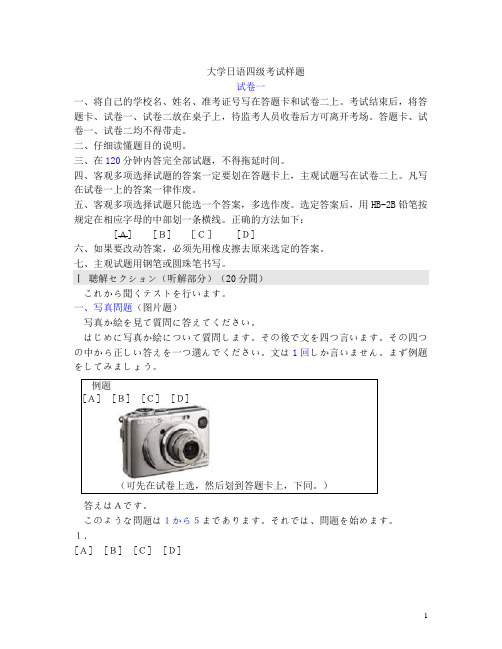
大学日语四级考试样题试卷一一、将自己的学校名、姓名、准考证号写在答题卡和试卷二上。
考试结束后,将答题卡、试卷一、试卷二放在桌子上,待监考人员收卷后方可离开考场。
答题卡、试卷一、试卷二均不得带走。
二、仔细读懂题目的说明。
三、在120分钟内答完全部试题,不得拖延时间。
四、客观多项选择试题的答案一定要划在答题卡上,主观试题写在试卷二上。
凡写在试卷一上的答案一律作废。
五、客观多项选择试题只能选一个答案,多选作废。
选定答案后,用HB-2B铅笔按规定在相应字母的中部划一条横线。
正确的方法如下:[A] [B] [C][D]六、如果要改动答案,必须先用橡皮擦去原来选定的答案。
七、主观试题用钢笔或圆珠笔书写。
Ⅰ聴解セクション(听解部分)(20分間)これから聞くテストを行います。
一、写真問題(图片题)写真か絵を見て質問に答えてください。
はじめに写真か絵について質問します。
その後で文を四つ言います。
その四つの中から正しい答えを一つ選んでください。
文は1回しか言いません。
まず例題をしてみましょう。
例題[A] [B] [C] [D](可先在试卷上选,然后划到答题卡上,下同。
)答えはAです。
このような問題は1から5まであります。
それでは、問題を始めます。
1.[A] [B] [C] [D]2.[A] [B] [C] [D]3.[A] [B] [C] [D]4.[A] [B] [C] [D]5.[A] [B] [C] [D]二、応答問題(应答题)始めに一人が短い文を一つ言う。
その後でもう一人がそれに答える。
正しい答えを[A][B][C][D]から、一つ選んでください。
文は一回しか言いない。
まず例題をしてみよう。
例題[A] [B] [C] [D]答えはAです。
このような問題は6から10まであります。
それでは、問題を始めます。
6.[A] [B] [C] [D]7.[A] [B] [C] [D]8.[A] [B] [C] [D]9.[A] [B] [C] [D]10.[A] [B] [C] [D]三、会話問題(对话题)二人の会話を聞いて、質問に答えてください。
2004和2003年日语4级听力材料(全)
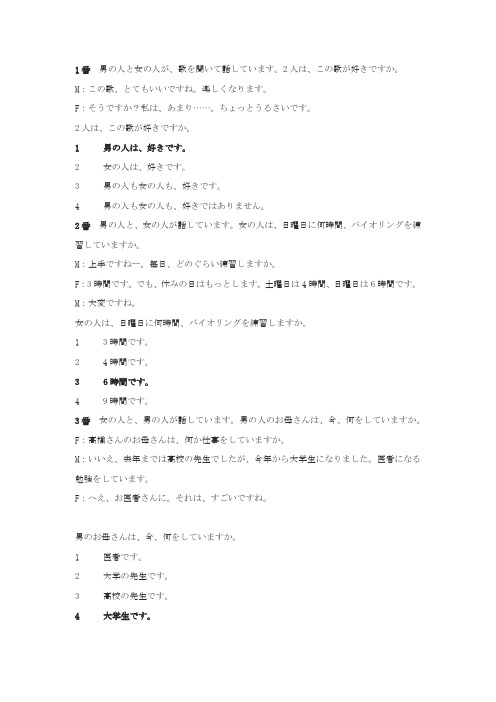
1番男の人と女の人が、歌を聞いて話しています。
2人は、この歌が好きですか。
M:この歌、とてもいいですね。
楽しくなります。
F:そうですか?私は、あまり……。
ちょっとうるさいです。
2人は、この歌が好きですか。
1男の人は、好きです。
2女の人は、好きです。
3男の人も女の人も、好きです。
4男の人も女の人も、好きではありません。
2番男の人と、女の人が話しています。
女の人は、日曜日に何時間、バイオリングを練習していますか。
M:上手ですねー。
毎日、どのぐらい練習しますか。
F:3時間です。
でも、休みの日はもっとします。
土曜日は4時間、日曜日は6時間です。
M:大変ですね。
女の人は、日曜日に何時間、バイオリングを練習しますか。
1 3時間です。
2 4時間です。
3 6時間です。
4 9時間です。
3番女の人と、男の人が話しています。
男の人のお母さんは、今、何をしていますか。
F:高橋さんのお母さんは、何か仕事をしていますか。
M:いいえ、去年までは高校の先生でしたが、今年から大学生になりました。
医者になる勉強をしています。
F:へえ、お医者さんに。
それは、すごいですね。
男のお母さんは、今、何をしていますか。
1医者です。
2大学の先生です。
3高校の先生です。
4大学生です。
4番男の人と、女の人が話しています。
男の人は、京都で、何をしましたか。
M:これ、京都で買ったお菓子です。
どうぞ。
F:ありがとうございます。
旅行ですか?M:はい、友だちの結婚パーティーでした。
おととい行って、夕べ帰ったんです。
有名なところへも行きたかったんですけど、時間がありませんでした。
男の人は、京都で、何をしましたか。
1仕事をしました。
2結婚パーティーに行きました。
3結婚しました。
4有名なところへ行きました。
5番男の人が話しています。
この人は、先週、何日休みましたか。
M:先週は、本当に忙しかったです。
私の会社は、土曜日と日曜日が休みです。
でも、先週の土曜日は、休まないで会社に行きました。
大学日本语四级试験 大学日语四级真题
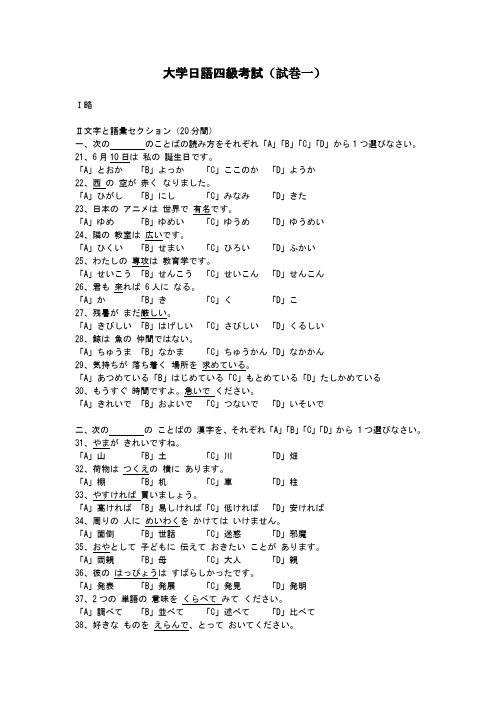
大学日語四級考試(試巻一)Ⅰ略Ⅱ文字と語彙セクション(20分間)一、次ののことばの読み方をそれぞれ「A」「B」「C」「D」から1つ選びなさい。
21、6月10日は私の誕生日です。
「A」とおか「B」よっか「C」ここのか「D」ようか22、西の空が赤くなりました。
「A」ひがし「B」にし「C」みなみ「D」きた23、日本のアニメは世界で有名です。
「A」ゆめ「B」ゆめい「C」ゆうめ「D」ゆうめい24、隣の教室は広いです。
「A」ひくい「B」せまい「C」ひろい「D」ふかい25、わたしの専攻は教育学です。
「A」せいこう「B」せんこう「C」せいこん「D」せんこん26、君も来れば 6人になる。
「A」か「B」き「C」く「D」こ27、残暑がまだ厳しい。
「A」きびしい「B」はげしい「C」さびしい「D」くるしい28、鯨は魚の仲間ではない。
「A」ちゅうま「B」なかま「C」ちゅうかん「D」なかかん29、気持ちが落ち着く場所を求めている。
「A」あつめている「B」はじめている「C」もとめている「D」たしかめている30、もうすぐ時間ですよ。
急いでください。
「A」きれいで「B」およいで「C」つないで「D」いそいで二、次ののことばの漢字を、それぞれ「A」「B」「C」「D」から 1つ選びなさい。
31、やまがきれいですね。
「A」山「B」土「C」川「D」畑32、荷物はつくえの横にあります。
「A」棚「B」机「C」車「D」柱33、やすければ買いましょう。
「A」高ければ「B」易しければ「C」低ければ「D」安ければ34、周りの人にめいわくをかけてはいけません。
「A」面倒「B」世話「C」迷惑「D」邪魔35、おやとして子どもに伝えておきたいことがあります。
「A」両親「B」母「C」大人「D」親36、彼のはっぴょうはすばらしかったです。
「A」発表「B」発展「C」発見「D」発明37、2つの単語の意味をくらべてみてください。
「A」調べて「B」並べて「C」述べて「D」比べて38、好きなものをえらんで、とっておいてください。
日语四级试题

日语四级试题(正文内容)第一部分:听力理解(共25题,每题1分,共25分)第一节:听对话,回答问题1. A. On Wednesday. B. On Thursday. C. On Friday.2. A. Watch a movie. B. Go to a concert. C. Visit a museum.3. A. She lost her wallet. B. She found her wallet. C. She forgot her wallet.4. A. She needs a break. B. She doesn't like roller coasters. C. She is afraid of heights.5. A. 9:15. B. 9:30. C. 9:45.(以下省略剩余题目及选项)第二节:听对话,回答问题26. A. A teacher and a student. B. A manager and a customer. C. A doctor and a patient.27. A. History. B. Biology. C. Chemistry.28. A. It was boring. B. It was difficult. C. It was interesting.(以下省略剩余题目及选项)第三节:听独白,回答问题46. A. A hotel. B. A library. C. A hospital.47. A. It is close to the beach. B. It has a swimming pool. C. It has a restaurant.48. A. On the first floor. B. On the second floor. C. On the third floor.(以下省略剩余题目及选项)第二部分:阅读理解(共25题,每题1分,共25分)第一篇51. B. In a library.52. D. The history of bicycles.53. C. He was injured in a car accident.54. A. In 2014.55. D. It is energy-efficient.(以下省略剩余题目及选项)第二篇76. B. They were punished for a mistake.77. C. It would be better than his previous job.78. A. Competition and politics.79. D. He helped invent the game of basketball.80. B. Methods of dealing with stress.(以下省略剩余题目及选项)第三部分:写作(共3题,第一题10分,第二题20分,第三题20分,共50分)第一题:请根据以下提示,写一篇100字左右的短文。
2003年日语四级考试试题及答案
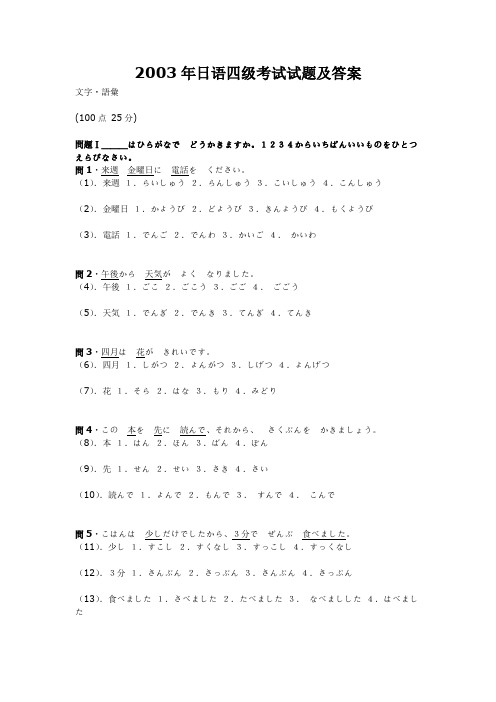
2003年日语四级考试试题及答案文字・語彙(100点25分)問題Ⅰ___はひらがなでどうかきますか。
1234からいちばんいいものをひとつえらびなさい。
問1・来週金曜日に電話をください。
(1).来週1.らいしゅう2.らんしゅう3.こいしゅう4.こんしゅう(2).金曜日1.かようび2.どようび3.きんようび4.もくようび(3).電話1.でんご2.でんわ3.かいご4.かいわ問2・午後から天気がよくなりました。
(4).午後1.ごこ2.ごこう3.ごご4.ごごう(5).天気1.でんぎ2.でんき3.てんぎ4.てんき問3・四月は花がきれいです。
(6).四月1.しがつ2.よんがつ3.しげつ4.よんげつ(7).花1.そら2.はな3.もり4.みどり問4・この本を先に読んで、それから、さくぶんをかきましょう。
(8).本1.はん2.ほん3.ばん4.ぼん(9).先1.せん2.せい3.さき4.さい(10).読んで1.よんで2.もんで3.すんで4.こんで問5・こはんは少しだけでしたから、3分でぜんぶ食べました。
(11).少し1.すこし2.すくなし3.すっこし4.すっくなし(12).3分1.さんぶん2.さっぶん3.さんぶん4.さっぷん(13).食べました1.さべました2.たべました3.なべましした4.はべました問6・このへやは古いですから、安いです。
(14).古い1.くろい2.くるい3.ふろい4.ふるい(15).安い1.ひろい2.せまい3.ひくい4.やすい問題Ⅱ___のことばはどうかきますか。
1234からいちばんいいものをひとつえらびなさい。
問1・でぱーとであたらしいかめらをかいました。
(16).でぱーと1.デパート2.テパート3.チパート4.モパート(17).あたらしい1.新しい2.薪しい3.新い4.薪い(18).かめら1.カヌラ2.カメラ3.カヌウ4.カメウ(19).かいました1.売いました2.店いました3.員いました4.買いました問2・じぶんのものにはなまえをかいてください。
- 1、下载文档前请自行甄别文档内容的完整性,平台不提供额外的编辑、内容补充、找答案等附加服务。
- 2、"仅部分预览"的文档,不可在线预览部分如存在完整性等问题,可反馈申请退款(可完整预览的文档不适用该条件!)。
- 3、如文档侵犯您的权益,请联系客服反馈,我们会尽快为您处理(人工客服工作时间:9:00-18:30)。
2003年日语能力考试四级真题及答案(word版下载)文字・語彙(100点25分)問題:___はひらがなでどうかきますか。
1234からいちばんいいものをひとつえらびなさい。
問1・来週金曜日に電話をください。
(1)〃来週1〃らいしゅう2〃らんしゅう3〃こいしゅう4〃こんしゅう(2)〃金曜日1〃かようび2〃どようび3〃きんようび4〃もくようび(3)〃電話1〃でんご2〃でんわ3〃かいご4〃かいわ問2・午後から天気がよくなりました。
(4)〃午後1〃ごこ2〃ごこう3〃ごご4〃ごごう(5)〃天気1〃でんぎ2〃でんき3〃てんぎ4〃てんき問3・四月は花がきれいです。
(6)〃四月1〃しがつ2〃よんがつ3〃しげつ4〃よんげつ(7)〃花1〃そら2〃はな3〃もり4〃みどり問4・この本を先に読んで、それから、さくぶんをかきましょう。
(8)〃本1〃はん2〃ほん3〃ばん4〃ぼん(9)〃先1〃せん2〃せい3〃さき4〃さい(10)〃読んで1〃よんで2〃もんで3〃すんで4〃こんで問5・こはんは少しだけでしたから、3分でぜんぶ食べました。
(11)〃少し1〃すこし2〃すくなし3〃すっこし4〃すっくなし(12)〃3分1〃さんぶん2〃さっぶん3〃さんぷん4〃さっぷん(13)〃食べました1〃さべました2〃たべました3〃なべましした4〃はべました問6・このへやは古いですから、安いです。
(14)〃古い1〃くろい2〃くるい3〃ふろい4〃ふるい(15)〃安い1〃ひろい2〃せまい3〃ひくい4〃やすい問題;___のことばはどうかきますか。
1234からいちばんいいものをひとつえらびなさい。
問1・でぱーとであたらしいかめらをかいました。
(16)〃でぱーと1〃デパート2〃テパート3〃チパート4〃モパート(17)〃あたらしい1〃新しい2〃薪しい3〃新い4〃薪い(18)〃かめら1〃カヌラ2〃カメラ3〃カヌウ4〃カメウ(19)〃かいました1〃売いました2〃店いました3〃員いました4〃買いました問2・じぶんのものにはなまえをかいてください。
(20)〃なまえ1〃各前2〃名前3〃各前4〃名萌(21)〃かいて1〃畫いて2〃晝いて3〃粛いて4〃書いて問3・だれかがきょうしつのそとにたっています。
(22)〃そと1〃化2〃北3〃外4〃引(23)〃たって1〃赤って2〃並って3〃丘って4〃立って問4・つめたいみずがのみたい。
(24)〃みず1〃木2〃水3〃氷4〃永(25)〃のみたい1〃飲みたい2〃飼みたい3〃飯みたい4〃飥みたい問題<______のところになにをいれますか。
1234からいちばんいいものをひとつえらびなさい。
(26)〃せんしゅう、____えいがをみました。
1〃おいしい2〃すずしい3〃いそがしい4〃おもしろい(27)〃____をひいて、あたまがいたいです。
1〃びょうき2〃くち3〃かぜ4〃おなか(28)〃「ゆうびんきょくはどこですか。
」「このみちを____いってください。
すぐそこですよ。
」1〃まえに2〃ちょうど3〃はじめに4〃まっすぐ(29)〃わたしはうたがへたです。
でも、うたは____。
1〃すきです2〃じょうずです3〃じょうぶです4〃りっぱです(30)〃このりょうりは____です。
1〃からい2〃くらい3〃さむい4〃みじかい(31)〃わからないことは、わたしに____してください。
1〃しつもん2〃じゅぎょう3〃べんきょう4〃れんしゅう(32)〃この____でパンをきってください。
1〃カップ2〃スプーン3〃ナイフ4〃フォーク(33)〃なつやすみにやまに____。
1〃あけました2〃あげました3〃のりました4〃のぼりました(34)〃「とうきょうまでのきっぷはいくらですか。
」「____は200えんで、こどもは100えんです。
」1〃おとこ2〃おとな3〃おんな4〃おとうと(35)〃きのうはあめでした。
でんしゃにかさを____、こまりました。
1〃おいて2〃もって3〃ふって4〃わすれて問題=______のぶんとだいたいおなじいみのぶんはどれですか。
1234からいちばんいいものをひとつえらびなさい。
(36)〃わたしのあねはやまださんとけっこんします。
1〃あねはやまださんのいもうとになります。
2〃あねはやまださんのおくさんになります。
3〃あねはやまださんのおばさんになります。
4〃あねはやまださんのごしゅじんになります。
(37)〃わたしのうちにはペットがいます。
1〃わたしのうちにはとりがいます。
2〃わたしのうちにはいしゃがいます。
3〃わたしのうちにはかぞくがいます。
4〃わたしのうちにはりょうしんがいます。
(38)〃ヤンさんはぜがたかいです。
1〃ヤンさんはかるいです。
2〃ヤンさんはつよいです。
3〃ヤンさんはわかいです。
4〃ヤンさんはおおきいです。
(39)〃ここはでぐちです。
いりぐちはあちらです。
1〃あちらからでてください。
2〃あちらからおりてください。
3〃あちらからはいってください。
4〃あちらからわたってください。
(40)〃あさってしごとをやすみます。
1〃あさってしごとをします。
2〃あさってしごとをしません。
3〃あさってしごとをおわります。
4〃あさってしごとをおわりません。
聴解(100点25分)問題:例(0)〃1〃2〃3〃4〃問題:解答番号解答欄Anwser Sheet③④②①③④②問1①問(1)〃1〃2〃3〃4〃問(2)〃問(3)〃1〃2〃3〃4〃問(4)〃問(5)〃1〃2〃3〃4〃問(6)〃問(7)〃1〃2〃3〃4〃問(8)〃1〃2〃3〃4〃問(9)〃1〃2〃3〃4〃問(10)〃1〃2〃3〃4〃問(11)〃1〃2〃3〃4〃問題;絵などはありません例問題;解答番号解答欄Anwser Sheet④②①③例正しい③④正しくない①②このページはメモに使ってもいいです問(1)〃1〃2〃3〃4〃問(2)〃1〃2〃3〃4〃問(3)〃1〃2〃3〃4〃問(4)〃1〃2〃3〃4〃問(5)〃1〃2〃3〃4〃問(6)〃1〃2〃3〃4〃問(7)〃1〃2〃3〃4〃問(8)〃1〃2〃3〃4〃問(9)〃1〃2〃3〃4〃問(10)〃1〃2〃3〃4〃読解・文法(200点50分)問題:______のところになにをいれますか。
1234からいちばんいいものをひとつえらびなさい。
問(1)わたしはときどきとしょかん___べんきょうします。
1〃に2〃で3〃へ4〃が問(2)パーティーで、だれ____ギターをひきましたか。
1〃を2〃も3〃は4〃が問(3)友だち____いっしょにえいがを見ました。
1〃に2〃へ3〃で4〃と問(4)母は1か月____1かいびょういんへ行きます。
1〃も2〃と3〃に4〃へ問(5)けさは何____食べましたか。
1〃が2〃か3〃に4〃も問(6)わたしはかぞく____てがみをもらいました。
1〃を2〃が3〃や4〃から問(7)テニスをしました。
それから、ピンポン____しました。
1〃は2〃が3〃も4〃と問(8)つよいかぜで電車____とまりました。
1〃が2〃と3〃を4〃へ問(9)父に電話をしました。
でも友だちに____しませんでした。
1〃は2〃も3〃へ4〃で問(10)かばんの中にさいふやかぎ____があります。
1〃や2〃も3〃など4〃から問(11)このみかんはぜんぶ____いくらですか。
1〃を2〃の3〃で4〃に問(12)おとうとはいしゃ____なりました。
1〃を2〃に3〃で4〃の問(13)へや____電気をけしてください。
1〃に2〃へ3〃と4〃の問(14)日本語____話しましょう。
1〃へ2〃で3〃と4〃に問(15)30分____まちましたが、バスは来ませんでした。
1〃ごろ2〃など3〃しか4〃ぐらい問題;______のところになにをいれますか。
1234からいちばんいいものをひとつえらびなさい。
問(16)先生はげんき____おもしろい人です。
1〃に2〃で3〃だ4〃や問(17)きのうは天気が_____。
1〃いいでした2〃よかったです3〃いかったです4〃よかったでした問(18)わたしはコーヒーにさとうを____飲みます。
1〃いれない2〃入れなく3〃いれないで4〃入れなくて問(19)すみません、ちょっと____ください。
1〃まち2〃まって3〃まった4〃またない問(20)これは先週友だちのいえで_____しゃしんです。
1〃とる2〃とるの3〃とった4〃とります問(21)きのうのよるは6時に____、ごはんをつくりました。
1〃かえる2〃かえった3〃かえって4〃かえったり問(22)いっしょに____ましょう。
1〃うたい2〃うたう3〃うたって4〃うたいて問(23)あしたは____から、あそびに行きませんか。
1〃ひま2〃ひまな3〃ひまの4〃ひまだ問(24)じしょを____、こまりました。
1〃わすれて2〃わすれた3〃わすれる4〃わすれないで問(25)スポーツは____ありません。
1〃すきく2〃すきに3〃すきには4〃すきでは問(26)ドアが____。
1〃しめます2〃しめています3〃しまっています4〃しまってあります問(27)すずきさんはきのう、たぶんうちに____でしょう。
1〃いた2〃いて3〃いる4〃います問(28)____とき、つめたいコーヒーを飲みます。
1〃あつい2〃あついの3〃あついだ4〃あついかった問(29)わたしはいつもシャワーを____からねます。
1〃あびる2〃あびた3〃あびて4〃あびます問(30)山川さんと____ながら、ごはんを食べました。
1〃話す2〃話し3〃話して4〃話した問題<______のところになにをいれますか。
1234からいちばんいいものをひとつえらびなさい。
問(31)きのうは___さむくありませんでした。
1〃よく2〃とても3〃あまり4〃たくさん問(32)パーティーはまだ____。
1〃はじまります2〃はじまりません3〃はじまりました4〃はじまっています問(33)____おんがくを聞きますか。
1〃どこ2〃どれ3〃どちら4〃どんな問(34)____レストランは古いです。
1〃あの2〃あれ3〃あちら4〃あそこ問(35)けさ7時____おきました。
1〃ごろ2〃など3〃まで4〃ぐらい問(36)このへやにはいすが一つしか_____。
1〃います2〃いません3〃あります4〃ありません問題=どのこたえがいちばんいいですか。
1234からいちばんいいものをひとつえらびなさい。
問(37)A「はじめまして。
どうぞよろしくおねがいします。
」B「____。
」1〃こちらこそ2〃おかげさまで3〃ごめんなさい4〃ごめんください問(38)A「きょうはこれで____。
ありがとうございました。
」B[そうですか。
じゃあ、また来てくださいね。
1〃こんにちは2〃はじめまして3〃しつれいします4〃しつれいしました問(39)A[マリーさんのかさはどれですか。
